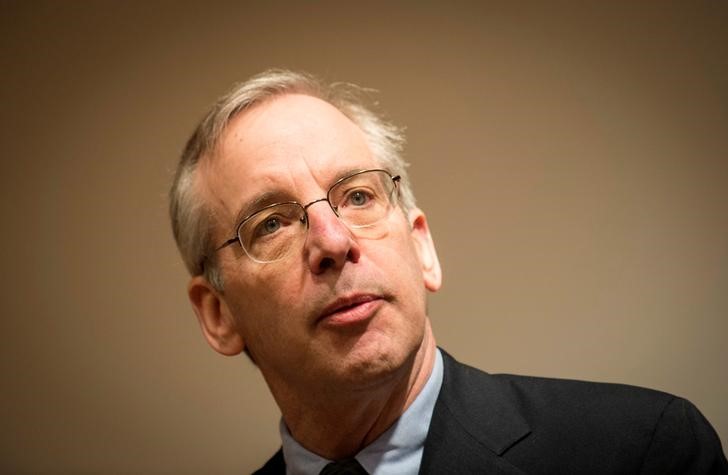 © Reuters. William Dudley, President of the New York Federal Reserve Bank, speaks at Brooklyn College in the Brooklyn borough of New York
© Reuters. William Dudley, President of the New York Federal Reserve Bank, speaks at Brooklyn College in the Brooklyn borough of New YorkBy Richard Leong and Catherine Ngai
NEW YORK (Reuters) – Financial products that bet on swings in equities and cryptocurrencies should be monitored to understand their risk to market stability, Federal Reserve Bank of New York President William Dudley said on Wednesday.
The comments came after BlackRock Inc (NYSE:), the world’s biggest asset manager, urged more regulation of the so-called inverse volatility-linked products that were hammered during a stock meltdown that wiped out $4 trillion in market value worldwide on Monday.
“The thing we worry about when we look at the financial system and worry about financial stability risk are: where are places where there are feedback loops?” Dudley said when asked about volatility-linked products and bitcoin futures at an event on banking culture co-sponsored by Reuters and the European American Chamber of Commerce.
Dudley cited the 1987 stock market crash, in which a product called portfolio insurance was blamed for causing a negative feedback loop that intensified a worldwide equities selloff.
Investors using exchange-traded products to bet on the VIX, Wall Street’s so-called fear gauge which measures expectations for near-term swings, were pummeled on Monday when the index posted its biggest single-day rise ever.
Meanwhile, global regulatory clampdown and moves by banks to ban purchases of bitcoin with credit cards have roiled digital currency prices. , the biggest cryptocurrency by market value, on Tuesday fell to a three-month low under $6,000 before rebounding to $8,119 on the Luxembourg-based Bitstamp exchange.
Such financial products offer ways for investors to hedge risk, he said. “But you have to make sure they’re appropriate and well designed.”
“With the stock market having a bit of a bumpy ride over the last days, there’s a question as volatility goes up, will that cause people to sell stocks,” Dudley said. “If that were the case, that could cause the stock market to be bumpy in the future.”
With the rebound in financial markets since Monday, Dudley said he has not changed his view about steady U.S. economic growth.
“My outlook hasn’t changed because the stock market is a bit lower than where it was a few days ago. It’s still up sharply than a year (ago),” he said.
Dudley had been chief economist at Goldman Sachs (NYSE:) for a decade before being appointed to head the New York Fed in 2007. He announced in November he would step down from his Fed position in mid-2018.
The ended down over 7 percent at 27.73, almost 50 percent lower than its highest level since August 2015 reached on Tuesday.
(Graphic: Volatility uncorked – http://reut.rs/2BG8RlH)
(Graphic: Stocks and volatility – http://reut.rs/2BIKcx6)
WELL FARGO’S CULTURE
While Dudley gave his thoughts about this week’s market volatility, he spoke mainly about banking culture on a panel where he and others said progress has been made since the global credit crisis but more could be done to bolster investor and consumer confidence and bank employee morale.
Bad incentive structures for employees and a lack of communication to management contributed to Wells Fargo (NYSE:) & Co’s sales practices scandal, Dudley said.
Dudley said that Wells Fargo employees were given “really bad” incentives. He added that when employees complained, it went up the chain of command but concerns either were not heard or ignored.
The bank reached a $190 million settlement with U.S. authorities in 2016 over its employees opening accounts in customers’ names without their permission to hit sales targets.
On Friday, Wells Fargo detailed new regulatory restrictions imposed by the Fed, including a cap on its assets until it improves its governance and controls.
Dudley said he is generally pleased with the “substantial progress” among banks to improve company culture and conduct, but that there is more room to grow.
Source: Investing.com




























